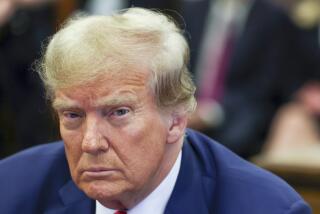Noriega Lawyer Plans Unusual Strategy : Courts: Ex-Panamanian dictator’s attorney will not make opening statement at the start of the trial, which begins today. Some say the move weakens the defense.
- Share via
MIAMI — As the first testimony approaches today in the drug-smuggling and racketeering trial of deposed Panamanian dictator Manuel A. Noriega, the nature of his defense is likely to remain unknown for several weeks because of a controversial move by his defense attorney.
Frank A. Rubino has chosen to defer his opening statement on Noriega’s behalf until after the conclusion of the prosecution’s case, which may last two months. He said last Friday that he wanted this statement to be fresh in the minds of jurors when he calls his own witnesses.
Prosecutor Michael P. Sullivan said he is planning to make a lengthy opening statement to the nine women and three men who were impaneled as a jury Friday. The prosecution will then call the first of an estimated 80 witnesses who will accuse Noriega of turning his country into a safe haven for U.S.-bound cocaine shipments by Colombian drug traffickers.
It is customary for defense lawyers, following the prosecution’s statement, to present an outline of their own, explaining to jurors the evidence they plan to present to show the innocence of their client.
“I think it’s a big mistake,” said lawyer Sam Burstyn, a friend of Rubino who has represented Lt. Col. Luis A. del Cid, a former co-defendant who was Noriega’s top military aide.
“You take the chance of letting the government’s case coalesce. Without an early statement from the defense, the jury won’t understand defense objections to the testimony of government witnesses.”
Last winter, Burstyn arranged for Del Cid to plead guilty to one count of conspiracy in return for the government’s promise to recommend leniency at his sentencing. Del Cid agreed to cooperate with the government and to testify against his former commander in chief.
Rubino’s decision to remain mute at the beginning of the trial adds fuel to speculation among some lawyers that he has not yet organized a coherent defense for Noriega.
In some of his pretrial court filings, Rubino has said he will rely on a defense of “public authority,” meaning a claim that U.S. government officials authorized and condoned Noriega’s drug-related activities in return for information that Noriega was feeding them about the actions of Colombian drug smugglers.
Rubino has told the court that no fewer than four former administrators of the U.S. Drug Enforcement Administration, or their subordinates, specifically endorsed Noriega’s use of Panama as a transfer point for Colombian-manufactured cocaine. Noriega supplied information about certain shipments to the DEA and even placed electronic monitoring devices in some so U.S. officials could track them, the lawyer asserted.
At the same time, Rubino has attacked the credibility of eight former co-defendants who will testify for the prosecution about Noriega’s links to Colombia’s Medellin drug cartel, calling them witnesses for hire.
To some legal experts, the two concepts seem contradictory. If Noriega’s conduct was authorized by the U.S. government, they reason, why is Rubino attacking those who describe this conduct?
“What does the defense want the jury to believe?” asked one lawyer who declined use of his name. “That Noriega did these things or didn’t do them?”
A source familiar with the prosecution’s case said Rubino may be planning to wage “guerrilla warfare”--attacking certain government witnesses but letting the testimony of others stand if he thinks he can explain Noriega’s conduct as having been authorized.
“If so, the jury is likely to be totally confused by this tactic,” the source said.
Rubino was not available for immediate comment. In addition, U.S. District Judge William M. Hoeveler, who will try the case, has forbidden lawyers on both sides from discussing the case with reporters outside court.
The trial is expected to take three or four months. If convicted on all 10 counts of racketeering, conspiracy and drug smuggling, Noriega would face a maximum penalty of 140 years in prison and more than $1 million in fines. He has remained in federal prison in Miami since his capture after the U.S. invasion of Panama in December, 1989.
More to Read
Sign up for Essential California
The most important California stories and recommendations in your inbox every morning.
You may occasionally receive promotional content from the Los Angeles Times.











